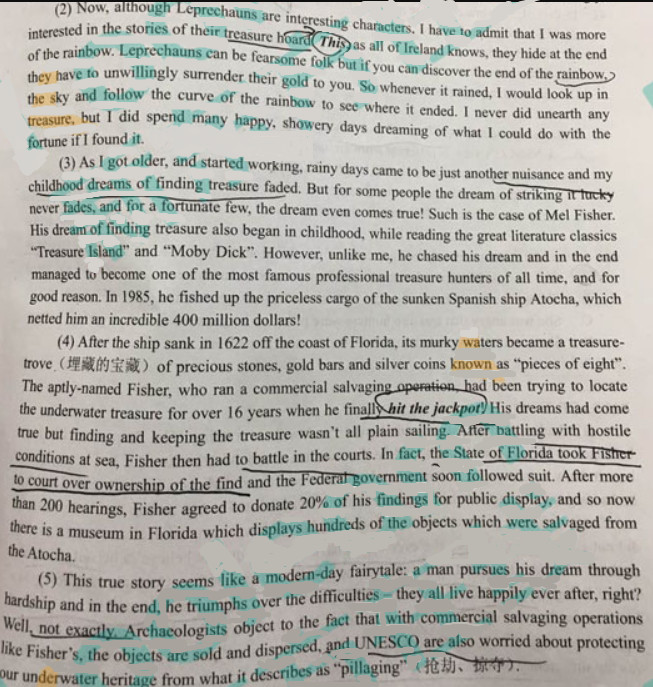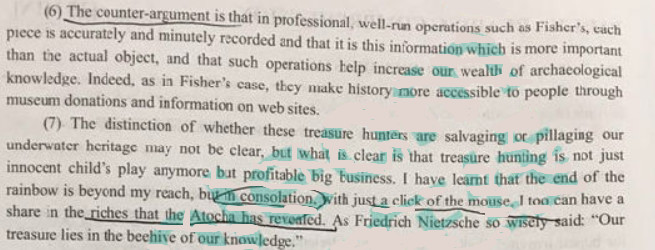 重要提示:
请勿将账号共享给其他人使用,违者账号将被封禁!
重要提示:
请勿将账号共享给其他人使用,违者账号将被封禁!
题目
 更多“I meant to go running this morning , but I overslept.”相关的问题
更多“I meant to go running this morning , but I overslept.”相关的问题
第1题
A.A. Y ou know , we haven' t gotten together in ages.
B.B. That' s OK. I've been busy lately , too.
C.C. Let's go for a walk.
第2题
阅读理解:(1)When I was a young girl living in Ireland, I was always pleased when it rained, becaude that meant I could go treasure hunting. What's the connection between a wet day and a search for buried treasure? Well, it's quite simpli, Ireland, as some of you may already know, is the home of Leprechauns-little men who possess magic powers and, perhaps more interestingly, pots of gold.


41.In para.4, the phrase"hit the jackpot" means __according to the context.

42.It can be conclude from Prars.5 and 6 that__.

43.How did the author feel about the tresure from the Atocha(Para.7)?

第3题
What I remember now about VE Day was the afternoon and the evening. It was a fine May day. I remember coming home at about five o'clock. My father and mother came in about an hour later. After dinner I said I wanted to see the bonfire (篝火), so when it got dark my father took me to the end of the street. The bonfire was very high, and some peo-ple had collected some old clothes to dress the unmistakable figure with the moustache (小胡子) they had put on top of it. Just as we arrived, they set light to it. The flames rose and soon covered the "guy." Everyone was cheering and shouting, and an old woman came out of her house with two chairs and threw them on the fire to keep the fire going.
I stood beside my father until the fire started to go down, not knowing what to say. He said nothing either. He had fought in the First World War and may have been remem-bering the end of that. At last he said, "Well, that's it, son. Let's hope that this time it really will be the last one. "
Where did the narrator live before the Second World War?
A.In a small city.
B.In London.
C.In Europe.
D.In the countryside.
第4题
Passage Two
I was only eight years old when the Second World War ended, but I can still remember something about the victory celebrations in the small town where I lived on the day when the war in Europe ended. We had not suffered much from the war there. But both at home and at school I had become accustomed to the phrases "before the war" and "when the war's over". "Before the war", apparently, things had been better, though I was too young to understand why, except that there had been no bombs then, and people had eaten things like ice -cream and bananas, which I had only heard of . When the war was over we would go back to London, but this meant little to me. I did not remember what London was like.
What I remember now about VE (Victory in Europe) Day was the May evening. After dinner I said I wanted to see the bonfire (大火堆) , so when it got dark my father took me to the end of the street. The bonfire was very high, and somehow people had collected some old clothes to dress the un- mistakable figure with the moustache (胡子) they had to put on top of it. Just as we arrived, they set light to it. The flames rose and soon swallowed the "guy". Everyone was cheering and shouting, and an old woman came out of her house with two chairs and threw them on the fire to keep it going.
I stood beside my father until the fire started to go down, not knowing what to say. He said nothing, either. He had fought in the First World War and may have been remembering the end of that. At last he said, "Well, that's it, son. Let's hope that this time it really will be the last one."
40. Where did the author live before the Second World War?
A. In London.
B. In a small town.
C. In Europe.
D. In the countryside.
第5题
Passage Four
"We're more than halfway (中途) now; it's only two miles farther to the tavern (客栈) ," said the driver.
"I'm glad of that," answered the stranger, in a more sympathetic way. He meant to say more but the east wind blew clear down a man's throat if he tried to speak. The girl's voice was quite attractive; however, later he spoke again.
"You don't feel the cold so much at twenty below zero in the Western country. There isn't such damp chill (潮冷)", he said, and then it seemed as if he had blamed the uncomplaining young driver. She had not even said that it was a bad day, and he began to be conscious of a warm hopefulness of spirit, and sense of pleasant adventure under all the woolen scarves.
"You'll have a cold drive going back," he said anxiously, and put up his hand for the twentieth time to see if his coat collar was as close to the back of his neck as possible.
"I shall not have to go back!" cried the girl, with eager pleasantness. "I'm on my way home now. I drove over early just to meet you at the train. We had word that someone was coming to the tavern."
46. How far was the drive from the train to the tavern?
A. One mile.
B. About four miles.
C. Two miles.
D. Less than four miles.
第6题
“We didn’t stay at bed and breakfast houses,” they said, “because we found that most families were away on holiday.”
I thought this was strange. Finally I understood what had happened. My friends spoke little English, and they thought ‘VACANCIES’ meant ‘holidays’, because the Spanish word for ‘holidays” is ‘vacations’. So they did not go to house where the sign outside said ‘VACANCIES’, which in English means there are free rooms. Then my friends went to house where the sign said ‘NO VACANCIES’, because they thought this meant the people who owned the house were not away on holiday. But they found that these houses were all full. As a result, they stayed at hotels!
We laughed about this and about mistakes my friends made in reading other signs. In Spanish, the word ‘DIVERSION’ means fun. In English, it means that workmen are repairing the road, and that you must take a different road. When my friends saw the word ‘DIVERSION’ on a road sign, they thought they were going to have fun. Instead, the road ended in a large hold.
English people have problems too when they learn foreign languages. Once in Paris. when someone offered me some more coffee, I said ‘Thank you’ in French. I meant that I would like some more, However , to my surprise the coffee pot was taken away! Later I found out that ‘Thank you’ in French means ‘No, thank you.’
11. My Spanish friends wanted advice about ______.
A. learning English
B. finding places to stay in England
C. driving their car on English roads
D. going to England by car
12. I suggested that they stay at bed and breakfast houses because ______.
A. they would be able to practise their English
B. it would be much cheaper than staying in hotels
C. it would be convenient for them to have dinner
D. there would be no problem about finding accommodation there
13. “NO VACANCIES” in English means ______.
A. no free rooms
B. free rooms
C. not away on holiday
D. holidays
14. If you see a road sign that says ‘Diversion’, you will ______.
A. fall into a hole
B. have a lot of fun and enjoy yourself
C. find that the road is blocked by crowds of people
D. have to take a different road
15. When someone offered me more coffee and I said ‘Thank you’ in French, I ______.
A didn’t really want any more coffee
B. wanted them to take the coffee pot away
C. really wanted some more coffee
D. wanted to express my politeness
第7题
(b) Explain in the context of Flavours Fine Foods, what is meant by:
(i) responsibility; (4 marks)
第8题
A.A.mean to come
B.B.meant to come
C.C.had meant to come
D.D.meant coming
第9题
A.I don't want it
B.Don't worry
C.You meant to do it
D.You buy one for me

 警告:系统检测到您的账号存在安全风险
警告:系统检测到您的账号存在安全风险
为了保护您的账号安全,请在“赏学吧”公众号进行验证,点击“官网服务”-“账号验证”后输入验证码“”完成验证,验证成功后方可继续查看答案!
